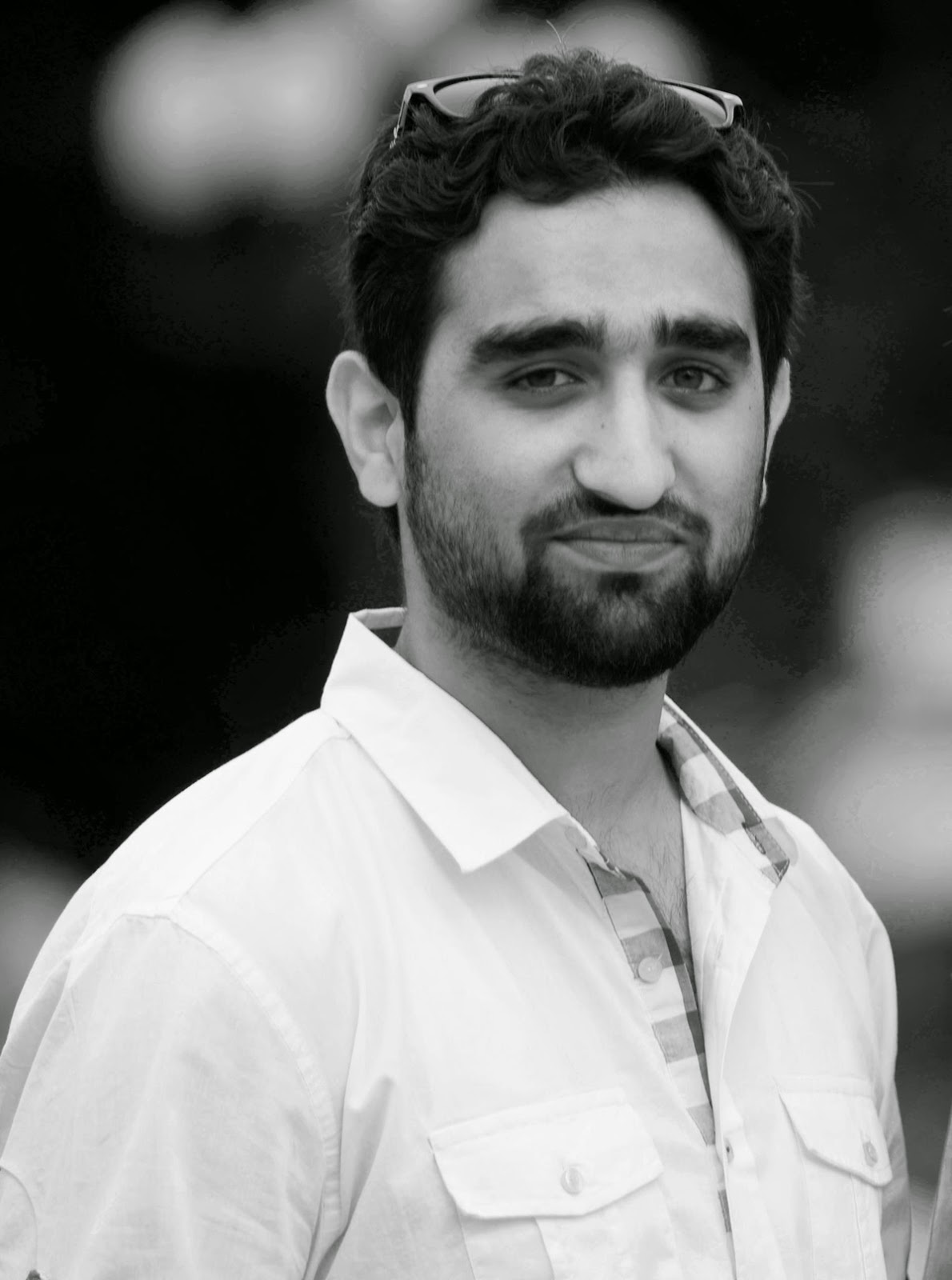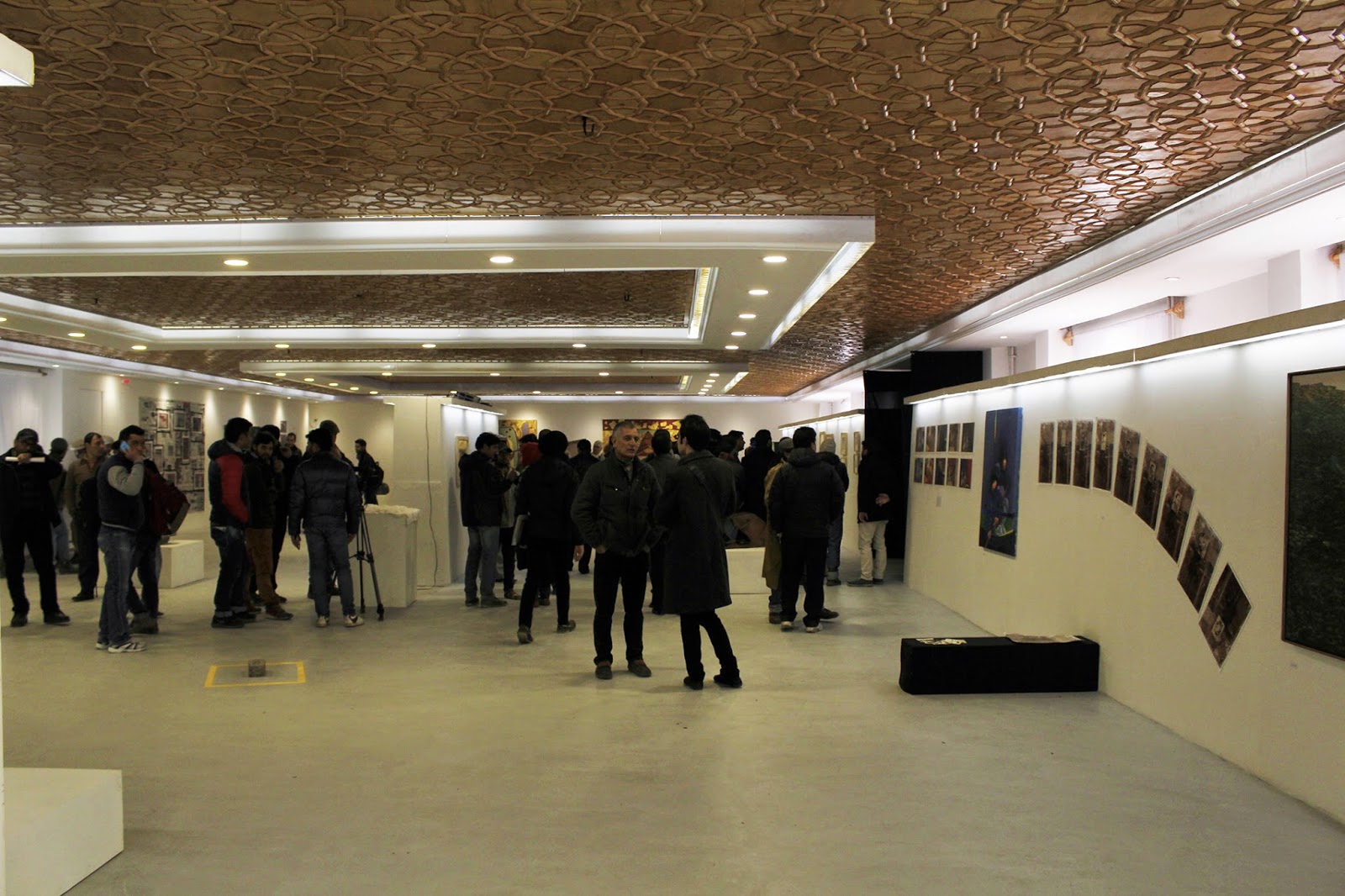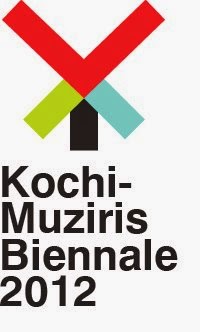- VS Gaitonde
- Ram Kumar
- Akbar Padamsee
- Amrita Sher-Gil
- Vanita Gupta
- Smita Kinkale
- Ratnadeep Adivrekar
- Tathi Premchand
- Nilesh Kinkale
- Prabhakar Kolte
- Chintan Upadhyay
- Prabhakar Barwe
- Shankar Palsikar
- Yashwant Deshmukh
- Prabhakar Kolte
- Sanchita Sharma
- Prakash Waghmare
- Ranjit Hoskote
- Premjish Achari
- Pankaja JK
- Contact
Wednesday, 4 February 2015
Monday, 12 January 2015
Kashmir Art Quest opened the first ever centre for contemporary arts and research in Kashmir - GALLERIE ONE, today at Srinagar.
 |
| Syed Mujtaba Rizvi |
To
address these issues Kashmir Art Quest has been working towards the
advancements of arts, artists and art education in Kashmir since its
foundation in August 2009. It is one of our foremost goals to create a
situation in Kashmir where an international art-scene might exist –
therefore channelize creative energy towards Kashmir. We celebrate a
culture of innovation & creativity, and strive to foster creative
and cultural entrepreneurship in the region. Over the years through various projects we have been able to revive the art scene in Kashmir, bring it to the public domain, and take it to the international stage.
We
are still the only independent contemporary arts organisation working
actively in Kashmir. However, today we launched the first ever centre
for contemporary arts and research in J&K after over 5 years of hard
work and planning.– a historical landmark, and a much needed space
especially in a place like Kashmir.
Gallerie One constitutes of five inter-disciplinary wings, unified in a single-access space spread over 7500 sq.ft.
1) Art Gallery
2) Archiving & Cataloging Centre.
3) Digital Media Lab.
4) Research Centre
5) Library and Leisure Space.
 |
| File Photo all copy right by Gallerie One |
The
project was conceived, formulated and implemented by Syed Mujtaba Rizvi
who is also the Founder and Managing Director of Kashmir Art Quest.
Mujtaba Rizvi heads Gallerie One as its Chief Executive Officer.
Fasal
Dar is the Chief Operating Officer at Gallerie One who ensures the
right implementation of the project. This project has been possible
after years of hard work, and now by the support received from J&K
Department of Tourism, who own the space. They prepared the space - at
1st Floor, Tourist Reception Centre, Srinagar - for this path-breaking
initiative (J&K Department of Tourism retains the ownership of the
space).
The
gallery opened with the inaugral show, 'Contemporary Practices and new
Media," curated by Syed Mujtaba Rizvi, showcasing works by 36 leading
and emerging artists. The exhibition explores the bold and challenging
practice by Kashmiri artists today. It showcases the shift from
traditional practices, and how this practices manifests in contemporary
culture. The current show ends on 31 March 2015, and will be accompanied by artist talks, workshops, and seminars.
PHOTO CREDITS: GALLERIE ONE
For More information visit: www.gallerie1.com
If you require any further information, please feel free to get in touch with me.
Regards,
If you require any further information, please feel free to get in touch with me.
Regards,
Syed Mujtaba Rizvi
Founder, CEO, Gallerie One.
Founder, MD, Kashmir Art Quest.
Founder, CEO, Gallerie One.
Founder, MD, Kashmir Art Quest.
Follow on Facebook. Click Here.
Twitter: @KashmirArtQuest
1st Floor, Tourist Reception Centre,
TRC Road,
Srinagar - 190001
Jammu & Kashmir.
+91 - 9596 355 455
('Gallerie One' and 'Centre for Contemporary Arts and Research' are under the auspices of Kashmir Art Quest)
Thursday, 1 January 2015
First project of MOG. ‘Janela’ is an exhibition that intends to stir up histories- Subodh Kerkar
Art is
not just my profession but the very breath of my life. My life
is inseparable from the creative quests which have nurtured me for the last
three decades. Creativity is immensely a private activity,
yet Art needs company. Art craves for an audience. Art
cannot sing in a desert. I felt the need of going beyond my personal
artistic adventures and work towards creating a vibrant art scene in Goa. The idea of the ‘Museum Of Goa’, ‘MOG’ was
born out of this pursuit. An endeavor to create a unique space for
Arts, MOG will bring together artists, curators, collectors, art enthusiasts,
educationists, students and audiences from all walks of life. It will
not only be a space for exhibitions, but also organize workshops, residencies,
lectures, talks and art courses.
MOG will embrace a universal perspective and provide a platform to Indian contemporary artists to showcase their works and connect them with international art milieus. MOG is envisioned less as a repository of objects and more as a laboratory of ideas, where various art forms – painting, sculpture, photography, music, theatre, design, video art, films, installations and many others are in constant dialogue with each other. Housed in a 1038 square meters space, designed by Architect Dean D’Cruz, MOG is situated on the Pilerne Plateau in North Goa, not too far from Calangute. ‘Janela – Migrating Forms and Migrating Gods’ is the first project of MOG. ‘Janela’ is an exhibition that intends to stir up histories. To dig into the recesses of historical archives, memory and celebrate the ‘connectedness’ of cultures. The waves that wash the shores of the west coast of India have not only carved and shaped rocks, but also ideas, dreams and narratives. The ocean has acted as a medium of intercontinental cultural diffusions. The word for a window in both Konkani and in Malayalam is adopted from the Portuguese language. It is ‘Janela’. The two languages share hundreds of Portuguese and Arabic words. ‘Janela’ is an attempt to peep into the shared histories of Goa and Kerala and also explore what historians A. G. Hopkins and Christopher Bayly described as Proto-globalization. It is also an endeavor to narrate history through the contemporary idiom.
MOG will embrace a universal perspective and provide a platform to Indian contemporary artists to showcase their works and connect them with international art milieus. MOG is envisioned less as a repository of objects and more as a laboratory of ideas, where various art forms – painting, sculpture, photography, music, theatre, design, video art, films, installations and many others are in constant dialogue with each other. Housed in a 1038 square meters space, designed by Architect Dean D’Cruz, MOG is situated on the Pilerne Plateau in North Goa, not too far from Calangute. ‘Janela – Migrating Forms and Migrating Gods’ is the first project of MOG. ‘Janela’ is an exhibition that intends to stir up histories. To dig into the recesses of historical archives, memory and celebrate the ‘connectedness’ of cultures. The waves that wash the shores of the west coast of India have not only carved and shaped rocks, but also ideas, dreams and narratives. The ocean has acted as a medium of intercontinental cultural diffusions. The word for a window in both Konkani and in Malayalam is adopted from the Portuguese language. It is ‘Janela’. The two languages share hundreds of Portuguese and Arabic words. ‘Janela’ is an attempt to peep into the shared histories of Goa and Kerala and also explore what historians A. G. Hopkins and Christopher Bayly described as Proto-globalization. It is also an endeavor to narrate history through the contemporary idiom.
I am
grateful to Valentina Gioia Levy for agreeing to curate the exhibition. She has
worked hard to give a real international perspective to the show.
I must
thank Yudhishthir Raj Isar (Professor of Cultural Policy Studies – The American
University of Paris) and Els Reijnders of The Van Gogh Museum for their
valuable advice and guidance.
I
am thankful to the Kochi Biennale Foundation for giving us a collateral status.
Subodh Kerkar
Director
MOG, Museum of Goa
Director
MOG, Museum of Goa
 |
| Recent work ‘Janela’ is an exhibition at Kochi Biennale Foundation |
When I met Subodh Kerkar for the first
time, last summer, he had already begun to work in the exhibition ‘Janela’ that
wanted to bring together mainly Goans but also some international artists. He
invited them to reflect on some issues, which revolved around the history of
the state of Goa and its relationship with Kochi. When he asked me to curate
this exhibition, my first curatorial concern has been now to take up a project
already started, respecting its original philosophy, but at the same time, by
giving to it my own curatorial cut. I liked the idea that the started point
with which Kerkar had challenged the artists was a linguistic element, the
Portuguese word ‘Janela’ that means window.
I had already dealt with the question of
the message as an expressive medium in artistic practice of Yoko Ono and
previously I had explored the relation between the linguistic and the pictorial
sign, and the act of writing as performative act in the work of the Canadian
artist Carl Trahan. Personally, I have considered the word ‘Janela’ as a
starting point with a strong potentiality for exploring new perspectives in the
relationship between art and language, image and sign, visual representation
and meaning.
After that, the first step has been to
analyze Goa’s art scene and understand how to relate to the wider context of
international artistic practices.I didn’t know the most part of the
artist to whom Subodh Kerkar asked to send a proposal. In many cases, it was
extremely difficult to find some information about their works and sometimes I
had nothing but few biographical elements for evaluate the proposals they
submitted to me. In some cases I found myself in the very uncomfortable
position of having to judge an artist on the basis of a single as I already
said, my concern was primarily to find common threads that could have been able
to open a direct dialogue between local and international artistic practices
and researches. That is why, although I certainly took into account local
specificities, my selection is the result of what can be considered as a
necessary adherence to current global trends.
Considering Subodh Kerkar’s input, I
thought that one of the most interesting topics to explore was the issue of
‘migration of visual forms’ seen as the recycling of figurative archetypes in
different cultural contexts. This theme has its roots in the history of the
past and links with the migration of people and ideas across space and time. In
particular, I wanted to pay a special attention to the images connected with
the transcendent, that have always had a great importance in European and
Indian past art. I particularly concentrated on the question of the sacred
image in contemporary times, and questioned its redefinition and the role that
it might have today in the context of artistic research, focusing of identity,
historical, socio-political and / or anthropological issues.
In my opinion, after the geo-political
and socio-economical changes that have characterized the last decade – called
by some experts as the third globalization period – was however interesting to
face such an issue and try to understand if whether art today could still bind
not only the sacredness, but also its visual representation.
Curatorial Note
Valentina Gioia Levy
All Copyright by MOG Project
Monday, 29 December 2014
Unfolding white...Decoding white...
 |
| Artist : RAJSHREE KARKERA |
UNRAVELING WHITE
Imagine the world as white...no? White....which is never used for decoding. Here is the world of Rajshree, the artist who precisely opens up her journey that is crystal clear. She leaves the viewer mesmerised with this unusual fathom of her experience in a very interactive way. She unfolds the untangled life of paper and connects it with self very thoughtfully. Using WHITE must have been a great challenge for Rajshree but she successfully opens up the story of her own significant world with elaborate simplicity. She has intricately crafted the delicate paper to form a 'being' to relinquish her emotional plethora. Rajshree throws a challenge to all of us,'this is my world, and it doesn't really matter if it not the same out there.'Her careful crafting of paper gives various dimensions to white. The shapes take and intricate form. She plays with the spaces within and forms a perspective of her own ideas. It is indeed a great challenge as an artist to work devoid colours. She probably sees her multidimensional world through plain paper. Significance of her creative forms thus leave a spread of multitasking and vision to think beyond two dimensional plain.One does not but help thinking about the careful play of her forms. The challenge of extreme white becomes simple or rather Rajshree makes it simple with her natural ability to transform the complex into a clear interpretation.
Jehangir Art Gallery, Mumbai
Dec 30th to 2014 -Jan 5th 2015
11am to 7pm
Dec 30th to 2014 -Jan 5th 2015
11am to 7pm
Subscribe to:
Comments (Atom)





